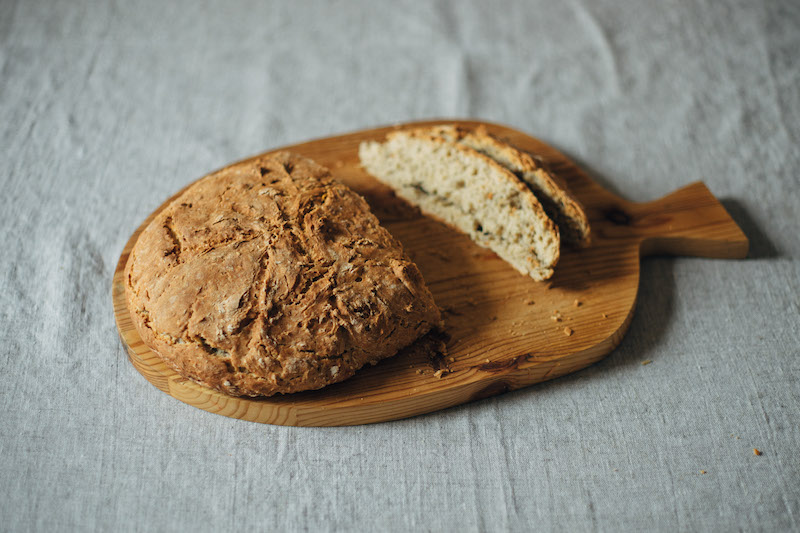It is commonly agreed that the bread Jesus broke and gave his disciples on the night he was betrayed was unleavened. He was instituting what we practice as the Lord’s Supper during a celebration of the Jewish Passover, which required unleavened bread.
At times the question has been raised, then, whether or not Christians should use unleavened bread in the Lord’s Supper in order to follow Christ’s example and to be fully biblical.
Evidence from Church History

While evidence as to the early church’s practice isn’t abundant, ordinary leavened bread seems to have been the norm. A difference gradually developed between East and West, though, with the East continuing to use leavened bread while the West adopted unleavened bread—a distinction between Orthodox and Roman Catholics that endures today. Biblical scholar Robert Letham suggests a reason for the Roman Catholic position: “Since the leavened bread was more likely to crumble and so fragment the body of Christ, Rome required the use of unleavened bread.”
During the Reformation, leavened bread was generally used among Protestants, though the Church of England continued using unleavened bread for a time before allowing both. John Calvin considered the type of bread used an indifferent matter: “Whether the bread is leavened or unleavened, the wine red or white—it makes no difference. These things are indifferent, and left at the church’s discretion.” (On a related note, see Don Carson’s recent Themelios editorial “On Disputable Matters.”)
What Did Jesus Do?
Arguments against the use of leavened bread have centered around Jesus’s practice. It’s not what Jesus used, proponents contend, and moreover, leaven is used to represent sin and evil in the Bible. But, as Letham points out, the Greek word used for “bread” in the New Testament (in relation to the Lord’s Supper) is not azymos, the term for unleavened bread, but artos, the word for “a small round loaf of ordinary bread.”
The word Jesus used does not require unleavened bread. Nor is leaven always a symbol for sin and evil in the Bible. In the parable in Matthew 13:33, for example, leaven seems to represent the kingdom of heaven. So the arguments against leavened bread are not persuasive.
What If Bread Is Unavailable?
Though not noted in discussions of the elements I’ve found, I think we should question the very idea that bread is required. The church has been planted all around the world, including areas where bread is unknown. Where bread is available, I don’t think congregations should switch from it, even if bread is unusual and even if a switch could “make the worshipers feel ‘at home’ in the liturgy and . . . demonstrate the relevance of Christianity to everyday life in its local forms,” an argument Geoffrey Wainwright considers but rejects.
To insist on bread where bread is unknown and wheat isn’t even grown would seem to hinder Christianity from ever taking on an indigenous form in such cultures. I guess Christian missionaries could teach new Christians how to grow wheat and make bread, but would that not communicate that Christianity is a foreign religion, and make of an indifferent thing a barrier to the gospel taking root?
For example, you are planting a church in Papua New Guinea; they have never seen wheat or eaten bread. After a congregation of believers gather, you want to introduce them to the Lord's Supper. What do you do? Import bread? Teach the nationals to grow wheat and make bread? In such contexts I’d recommend using any common staple food that can be broken to fit the symbolism of Christ’s body broken for us.
Essential or Incidental?
I can agree with Wainwright and Gregg Allison that using bread is supported by New Testament example and the legacy of church history. But to insist on the necessity of bread is to confuse what’s essential to the meaning of the Supper with what’s incidental.
I further agree with Wainwright and Allison (both of whom argue for the retention of bread, if possible) that we shouldn’t switch from the traditional elements purely for the sake of novelty. That would show a lack of respect for the seriousness of the Lord’s Supper and the value of tradition. In the final analysis, though, I think the nature of the elements remains an indifferent matter.
And for what it’s worth, I’d say the same in response to arguments that we must use real wine rather than grape juice. This too I regard as something not essential to the meaning of the Supper—another indifferent matter. There are numerous other debated issues surrounding the Lord’s Supper and baptism that I seek to answer in 40 Questions About Baptism and the Lord’s Supper (Kregel, 2015).
Is there enough evidence for us to believe the Gospels?
 In an age of faith deconstruction and skepticism about the Bible’s authority, it’s common to hear claims that the Gospels are unreliable propaganda. And if the Gospels are shown to be historically unreliable, the whole foundation of Christianity begins to crumble.
In an age of faith deconstruction and skepticism about the Bible’s authority, it’s common to hear claims that the Gospels are unreliable propaganda. And if the Gospels are shown to be historically unreliable, the whole foundation of Christianity begins to crumble.






























